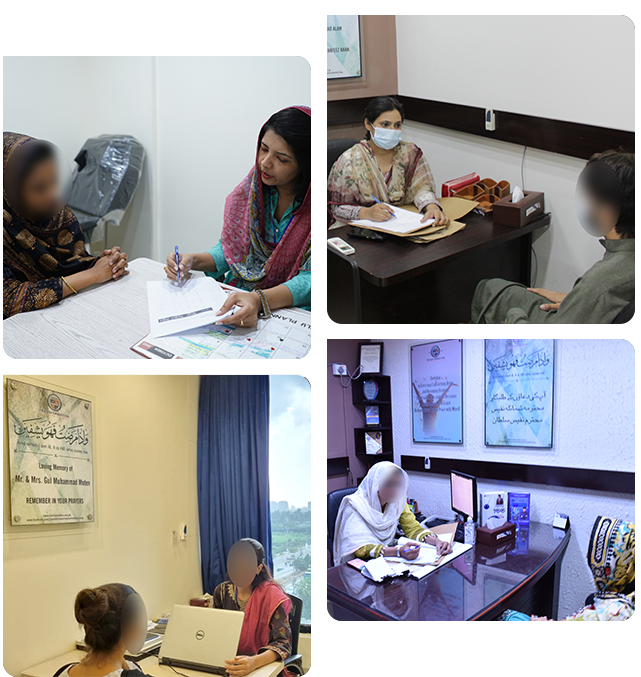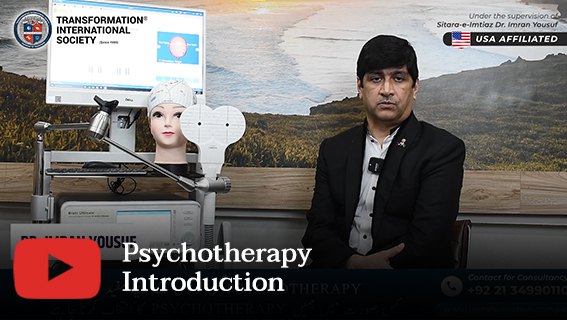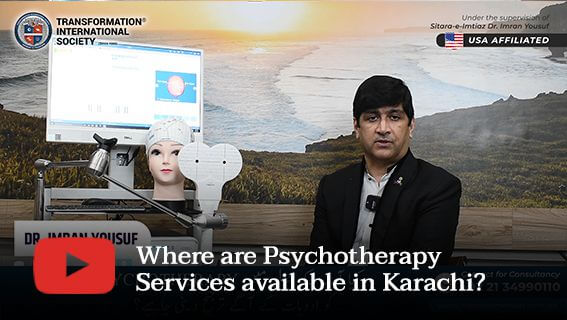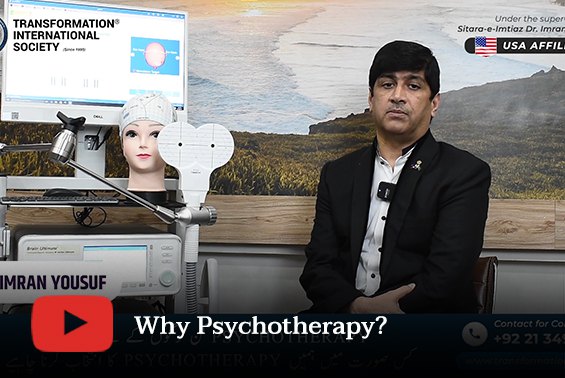
Psychotherapy Treatment & Psychologist in Karachi
Book An Appointment For Intake Session / Consultancy / OPD charges Rs. 1000/- only
Connect With Us For The Consultancy
What is Psychotherapy?
Psychotherapy is derived from the word “psycho” meaning ‘mental instability’ and “therapy” meaning ‘treatment’ or ‘cure’. Psychotherapy, also commonly known as “talk therapy”, is a method of psychological treatment that compromises of an expert simply communicating with the person to treat various mental health conditions. Psychotherapy helps you identify your feelings, thoughts and behavior. It makes one aware of his/her moods and surroundings, thus providing insight into your problems.
Psychotherapy works by providing you with coping mechanisms to deal with stressors and problems you find hard to identify. Psychotherapy aims to facilitate people with emotional difficulties and mental health illnesses such as depression, anxiety, eating disorders, sleep disorders, personality disorders, etc. It works by making the person deal with the impact of trauma, loss of a loved one, and various emotional states that cannot be treated with medicine.

Inspire for Better Living…
Let’s Connect!
What are the types of Psychotherapy?
Psychotherapy is a vast subject with various branches and sub-branches. Mental health specialist, such a Psychologists and Psychiatrists, use different types of therapies according to the client’s level of functioning, needs and preferences. Some of the many types of therapies include
- Cognitive behavioral therapy
- Psychodynamic therapy
- Interpersonal therapy
- Psychoanalysis
- Supportive therapy
- Dialectical behavior therapy
- Art therapy
- Play therapy
What are the benefits of Psychotherapy?
Evidence-based practice suggests that people receiving psychotherapy reported symptoms of relief and demonstrated better functioning in their daily activities. It has been proved to improve undesirable behaviors, difficult emotions and bring about positive changes in their routine. The researches also concluded that people undergoing psychotherapy reported fewer sick leaves, fewer medical issues and increased work efficiency. To benefit the most from psychotherapy, the key is to comply with your therapist and implement the activities and coping mechanisms you have been taught in your routine for e.g.; writing out your thoughts in a journal, incorporating problem-solving strategies, anger management strategies, and monitoring your emotions and interactions.
What is the age range for seeking Psychotherapy?
Psychotherapy can be applied on people of all age groups. Children as young as 3 years of age and older adults aged 65 and above have sought psychotherapy. However, the form of Psychotherapy and its effectiveness differs depending on the age group being addressed. For example, Play Therapy is the most effective on preschoolers aged 3 to 5 since they face difficulties expressing themselves through words and increasingly engage in pretend play. By the time children reach the ages of 7 to 9 years, they have developed a more coherent speech and are able to verbalize their thoughts and feelings.
This makes them a good candidate for Cognitive Behaviour Therapy (CBT) which facilitates clients to work on their negative thoughts and behaviours. CBT is also effective for teenagers and adults who suffer from various mental health issues due to their increased independence. In addition, both Individual and Group Counseling is preferred for the elderly aged 65 and above, but experts recommend starting off with Individual Counseling so that the client receives a safe, non-judgmental environment to express himself/herself and only when the client is comfortable, he/she should go for Group Therapy to identify with other clients sharing similar experiences as him/her.
How to find a qualified Psychotherapist?
There are several ways to find a qualified psychotherapist, the first one being referrals by doctors, friends family, etc. who have previously received consultation. This also includes clients’ testimonials who have given 5 star ratings to mental health organizations and recommend others to seek professional help. For example, Muhammad Ilyas suffered from depression for 20 years but is now successfully treated and living a wonderful life after having Repetitive Transcranial Magnetic Simulation (rTMS) sessions at Transformation Wellness Clinics (TWC). He strongly recommends everyone in need to get professional help and visit Transformation Wellness Clinics to get “transformed”.
Moreover, with the rise in technology, people are turning towards online platforms. The Transformation Wellness Clinics’ website is a great place to start, where all the details regarding services being provided and list of qualified psychotherapists are mentioned, including Dr. Imran Yousuf, Ms. Amima Salam, Dr. Sumbul Mujeeb, Ms. Nighat Altaf and many others. Furthermore, clients can easily book an appointment with their preferred therapist through the website and WhatsApp. TWC also provides online counseling sessions via Zoom and WhatsApp for those who are outside Karachi, abroad and even those within Karachi who are unable to come to the clinic for various reasons. Additionally, qualified psychotherapists can be found via social media. Transformation Wellness Clinics has a huge fan following on Facebook, Instagram, LinkedIn and Youtube. TWC updates itself regularly, posting various informative content, including details of TWC’s available and qualified psychotherapists.
Best Psychologist and Psychotherapy Services in Karachi
Where are Psychotherapy Services available in Karachi?
Transformation Wellness Clinic provides desired therapists through USA certified Clinical Psychologists. The team of psychotherapists, hypnotherapists, psychiatrist, and neurologist critically examines individual cases and designs the best treatment plan in order to provide the best services in Pakistan. The aim of Transformation Wellness Clinics is to inspire people for better living.
Why Psychotherapy?
Psychotherapy can be as useful as medicine in some scenarios, sometimes all the emotions and frustration piled up needs a way out, therefore a psychotherapist is a correct person to open up to and share your vulnerabilities. A psychotherapist never judges a person despite of his race, gender, ethnicity, cast, creed, culture, or doings, for e.g. if someone who does a murder comes to a therapist, in this case, for that particular therapist he/she is not a murderer but a client that needs help. This is why it is important to seek help in a professional setting, to get diagnosed and get the required help in a legal way.
How to get started?
- Find the right therapist.
- Understand the number, duration and cost of sessions.
- Design a treatment plan with your therapist and share your concerns.
- Stick to the plan, stay motivated, be patient and do not quit.
- Discuss the type of therapy your therapist is going to use.
- Discuss the goals and outcome of your treatment.
Things you need to keep in mind:
- Be as honest as possible.
- You should feel at ease communicating with your therapist.
- Don’t make haste, do not expect results instantly.
- Talk to your therapist about any inconvenience.

How a psychotherapy session is conducted?
Psychotherapy sessions can be conducted in any form, such as in a group setting, individually or with the family. It requires the attentiveness of both the therapist and the client. The frequency and duration of sessions can vary according to the client’s needs. It can be short term, taking a few days or weeks, or it can be long term, taking months to years, depending on the severity of the issue and the treatment goals, expectations and duration, which is mutually decided by the therapist and the client. Also, one of the most important aspects of psychotherapy is confidentiality. The client shares their personal thoughts, feelings and intimate relationships with the therapist, therefore the client’s confidentiality should never be compromised.
Connect with top Psychotherapist in Karachi
Book An Appointment For Intake Session / Consultancy / OPD charges Rs. 1000/- only
Psychotherapy as a Service
Millions of people around us are depressed, stressed and worried. Everybody has their own struggles and every day we all are fighting a new battle. Recent research by the World Health Organization (WHO) states that close to 1 billion people live with mental health disorders. There are so many causes, due to which they do not even realize that they are not completely healthy, such as; lack of awareness, considering mental health as a taboo, ignorance etc., leading the person towards self-destruction. There is a strong need to realize that it can happen to anyone, it is absolutely treatable and should not be taken as a sign of weakness. One needs to identify that if they have any unusual mental state, it is not only detrimental for them but they are a continuous challenge for the people surrounded by them.

FAQ:
For more information, please visit our website : https://transformation.com.pk/
For more information, please visit our website : https://transformation.com.pk/
For more information, please visit our website : https://transformation.com.pk/
For more information, please visit our website : https://transformation.com.pk/



